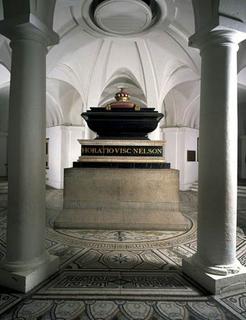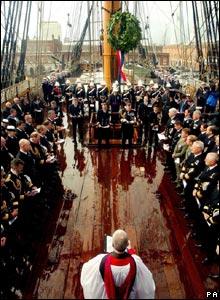
Happy Trafalgar day, chums. Nelson, among his other deep impressions on British society, had a huge impact on poets (the title of this post is Byron's description of the late Admiral) and other artists. The timing and nature of his death made him a natural draw for the romantic poets. His 'heroic' passing helped provide the bedrock of self-assured patriotism that marked the more extroverted bombast of Kipling and his peers writing at the end of a century of British ascendancy that Nelson had helped kick off. The influence of Nelson and his navy can still be felt in everyday life and the mundane; his image is used to sell insurance in England with no less gusto than music hall stars used to belt out "Hearts of Oak" to Edwardian crowds.
Therefore I thought I would mark this 200th anniversary of his greatest victory and his death one last time this week by reproducing the latest effort by Britain's Poet Laureate Andrew Motion, a poem called "What Have We Here?" that reflects on the endless fascination with Nelson that for many Britons begins in the moral clarity of childhood, when our side can do no wrong and the enemies of yesterday are always evil.
 WHAT HAVE WE HERE?
WHAT HAVE WE HERE?Dad got home late, and I never heard the gravel
Or his door-clunk in the drive-through,
Still less his shoeless step
As he crept to perch on my bedside.
‘What have we here?’
It was a Yeomanry day or used to be,
And not even the thick whiskery cloth
Of his battle-dress trousers
Could blunt the edge of a Ladybird under the covers.
Nelson, dad.’ He squared his shoulders.
The order was: no reading after lights out,
So I was caught cold – like the polar bear
I’d just seen dispatched
In the pack-ice off Spitzbergen.
On the other hand, Nelson was England’s darling.
I’d seen that too, in the cock-pit death-scene
With Hardy’s kiss on my forehead.
Dad checked a page, before his weight lifted and went.
I fell at once into a dream of Victory –
How she wallowed through Biscay,
With her battle-tatters smoking –
Then gave my signal for a change in nature.
At which she side-stepped her Channel lane,
Shimmied over the Hampshire hills,
Caught the surge of London,
And made fast to a spire of Westminster
Overlooking Trafalgar Square.
With that, the famous brandy barrel
Burst its ropes at the main mast,
And the man himself slithered out
Crumpled and glistening as a baby
But perfectly fit again.
He proved this by scaling the column
A grateful nation had raised for him,
And leaned on his coil of rope to wait
For as long as it took to stiffen into stone.
Next morning, with dad in his city suit again,
I woke in time to snaffle his Times at breakfast
And rolled it into a telescope
So I could show him my grasp of history.
‘What have we here?’
This time of course I couldn’t answer.
The thing was pressed to my blind left eye,
And supposing I’d said ‘Your face’
He would know I was only inventing things.
© Andrew Motion, October 17, 2005.



1 comment:
Thank you Mr Weasel Sir.
Thank you for remembering Horatio Lord Nelson, he who spawned a gazillion pub names and who remains an object of fascination for many. I always like to think of him as a passionate maverick, obsessive in so many aspects of his life.
I could not even begin to compete with your bewildering commemeration of the bicentenary of Trafalgar so I wrote a crappy poem instead.
Post a Comment